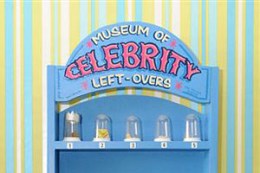
A museum in England devoted to ephemera discarded by famous hands (or veritable garbage, depending on your point of view) has gained a cult following.
The Museum of Celebrity Leftovers was opened in 2004 by Michael and Francesca Bennett inside their Old Boatstore Café in Kingsand, a village by the sea in Cornwall. Envisioned as a way to commemorate celebrity visits to the restaurant, the museum displays about 20 bits of memorabilia that have been blessed with a famous touch.
The impetus for the museum came to the Bennetts after musician Pete Doherty dined at the café and left behind panini crumbs. Around the same time, fashion photographer David Bailey failed to polish off his sandwich crust after lunch at the Boatstore, and the idea was born.
(LIST: Top 10 Crazy Celebrity Collectibles)
The pieces are now displayed under glass domes in shelves on a wall of the café. Among others, luminaries such as Prince Charles and the actress Mia Wasikowsa have both left behind food remnants, which are now artifacts in the museum. There are no preservatives used on the leftovers, but apparently that hasn’t caused mold — some items are simply shriveled up.
Owner Michael Bennett told the BBC that he was proud of the museum’s online and international following, and that he and his wife are “just amazed that it captured so many people’s imagination.”
Society’s collective obsession with fame has already fueled the explosion of celebrity-focused magazines, gossip websites, and the 24-hour news cycle. Perhaps a Museum of Celebrity Leftovers is a natural extension of this impulse. Just as paparazzi try to capture shots of boldface names going about their everyday lives – pumping gas! shopping for milk and toilet paper! – seeing the remnants of celebrities’ meals brings them down to a human level. Indeed, famous people make crumbs just like everyone else.
Celebrity enthusiasts should go now, however, as the future of the museum is unclear. The Bennetts are looking for someone to buy the café, but the museum is not included in the sale. Michael Bennett hopes that his collection will remain as a piece of social history somewhere in the UK. He joked to the BBC, “If the Victoria and Albert Museum took it on, that would be nice.” One can dream.






